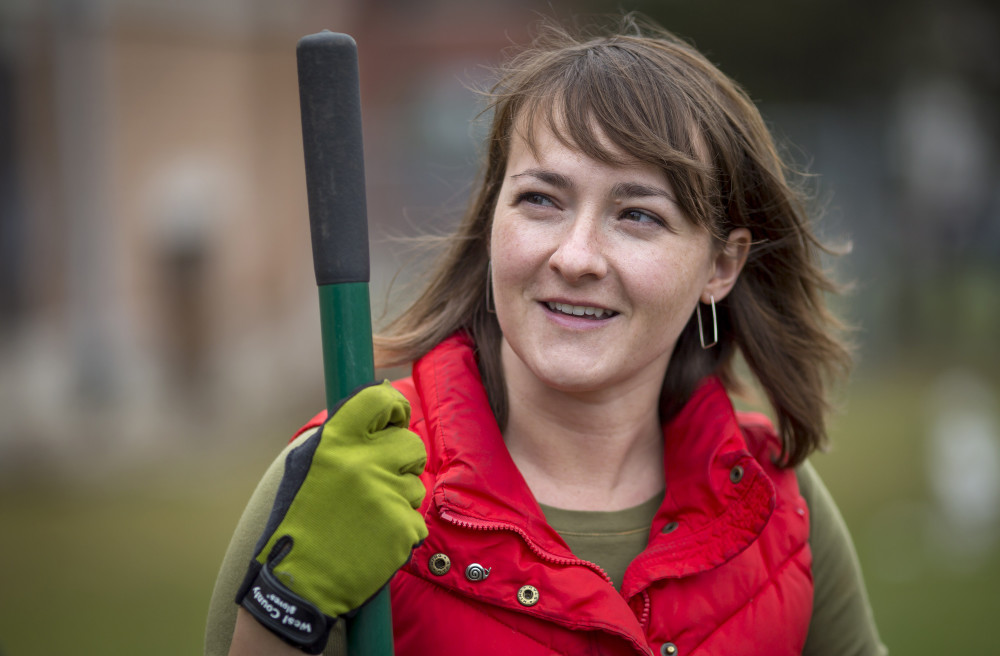By Paulina Firozi
Chicago Tribune.
CHICAGO
Breanne Heath started with a patch of dirt on the South Side and a simple idea: a farm where visitors can pick their own fruit.
Now the nearly half-acre site in the Back of the Yards neighborhood is slated to open this summer as The Pie Patch, a pick-your-own farm in the city, offering fresh, organic raspberries, ground cherries, rhubarb, pumpkin and other produce.
Heath, a community garden educator, came up with the idea of an urban fruit farm years ago when she realized how much she loved picking apples and strawberries but had to drive to Indiana or Michigan because there was no local option.
The idea is simply to get more food to more people, she said, “if they’re willing to pick it themselves.”
The plot at 5045 S. Laflin St. is owned by Su Casa Catholic Worker, a nonprofit that provides food and shelter to Spanish-speaking women and children in Chicago. Heath will manage the farm and plans to collaborate with Su Casa to bring some proceeds to the shelter’s pantry and soup kitchen. Depending on how much fruit they sell in a day, Heath said, she will give Su Casa either half of the proceeds or some of the leftover produce.
Su Casa will also provide volunteers to work on the garden once it’s up and running, said executive director Cathy St. Clair.
Preserving the space is a benefit to the community, one example of “how we can use available land, land that’s just sitting there not being used,” St. Clair said.
Heath said she doesn’t expect to make a profit on the farm but points to other benefits.
“It’s something that I have to keep reminding my friends and family when I say, ‘Oh, I just spent all my money on strawberry plants’ or ‘I just had to buy all these supplies,'” she said.” This is something that people might find value in, something that’s good for the community. It’s more about doing something that is needed than doing something that is going to give me a profit.”
Though there are other urban farms in the city, Heath said there is a unique appeal to a pick-your-own operation.
“People are becoming more aware of healthy food and local food,” she said. “Also growing their own food and having more of an experience with it.”
Sarah Krieger, a registered dietitian and nutritionist with the Academy of Nutrition and Dietetics, said she liked the idea of “bringing the farm to the city.” She said there can be an educational and nutritional benefit for people who pick their own produce locally, especially children.
“If they only see fruits and vegetables in the store, they think they grow right outside the grocery store,” Krieger said. “But if they get in the dirt, pick it right off the vine and eat it, it’s a great learning tool.”
Cecelia Pompeii, a clinical dietitian at University of Chicago’s Comer Children’s Hospital, said especially in a low-income neighborhood, an urban farm is a resource for people who may only have access to public transportation.
Pompeii, who has a healthy food blog with another dietitian said she believes the general population is starting to think more about how food is grown and sourced, but it’s still not “in the forefront of everyone’s mind.” Having an urban farm may plant an idea about healthier eating as an alternative to processed or fast foods.
Providing low-cost, healthy options to local residents, Heath said, is a goal of The Pie Patch. Part of the benefit of having people pick their own fruit, is being able to cut out the costs of harvesting and transportation.
Some produce may be priced by the pound. But mostly, customers will pay a flat rate for a container and be allowed to fill it regardless of weight.
Similar to some farmers markets in Chicago, The Pie Patch will allow customers who use food stamps to pay the same rate for twice the amount of produce, St. Clair said. The farm will be set up to scan and accept Supplemental Nutrition Assistance Program cards, she added.
According to The Pie Patch website, fruits and vegetables that will eventually be “in season” at the farm are: raspberries, rhubarb, grapes, strawberries, sweet potatoes, sweet pumpkin and squash. The earliest the farm will open is June.
Heath will be finding space for about 3,000 strawberry plants in the coming weeks. Strawberries will be the farm’s biggest crop, but they will not be ready until late spring 2016.
Heath works as a garden and education manager at Peterson Garden Project, an organization that teaches people about community gardening. In her free time she will manage The Pie Patch and expects visitors will be able to pick fruit twice a week at the farm to start.
Heath called the space “peaceful” and said she hopes the farm can be a place where people “linger and have a picnic and just enjoy things.”
“That’s what I did when I was growing up, I just spent all day outside in the summer, picking blackberries and picking flowers,” she said. “If other people can have that experience, it will be nice to provide that.”














































































































































































































































































































































































